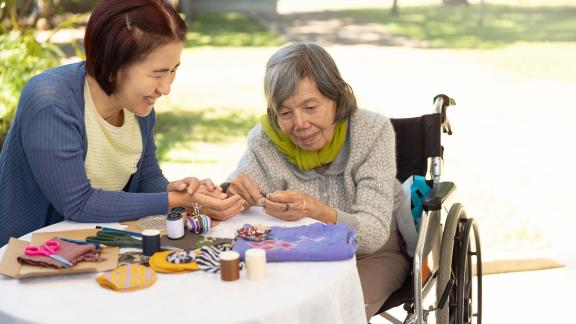Care Certificate

Launched in 2015, Skills for Health, Skills for Care and NHS England worked in partnership to develop the Care Certificate, which was developed as part of the Cavendish Review.
The Care Certificate aims to equip health and social care support workers, including healthcare assistants, assistant practitioners, and trainee nursing associates with the knowledge and skills which they need to provide safe and compassionate care.
To do this, individuals will need to complete the care certificate within the first 12 weeks of beginning the process and meet all of the 15 Care Certificate standards.
Each standard is underpinned by a learning and assessment criteria, and include topics such as duty of care, working in a patient-centred way, and communications. Care Quality Commission states that “the Care Certificate sets standards for the induction of health care support workers to form the foundation for ongoing learning and development”. They will also use their assessment framework to assess providers approaches to staff induction and using nationally recognised good practice, such as the care certificate, is a good way to help show this.
Many employers are now offering the Care Certificate as part of their apprenticeship programme or T Level industry placement.
A short animation has been published, explaining what the care certificate is, who it is for and why is it so important.
New Care Certificate scenarios
Support workers can now access scenarios set within inpatient rehabilitation and critical care workplaces, supporting them to apply the principles behind the Care Certificate.
The two new scenarios may be of particular interest to Allied Health Professionals (AHPs) and help to ensure that the care certificate e-learning programme has context for all professions across the health and care system.
Each new scenario uses patient case studies and examples from the working environment to help colleagues apply the Care Certificate Standards within their work setting. The scenarios cover key aspects including preparing for a shift, handover meetings, and examples of clients and factors of their care to consider. Learners then experience supporting the clients through a particular session and updating their care plan or patient notes afterwards.
All scenarios within the Care Certificate e-learning programme depict individual care settings to enhance workplace knowledge and to help assessors in the practice of assessing learners in their place of work. They are a great way of enhancing a person’s overall knowledge of the health and care system and are a valuable resource to all healthcare professions.
The interactive sessions also support colleagues to have conversations with their assessor around any observations and decisions made during the session.
The two new scenarios can be accessed within the Care Certificate e-learning programme:
Get involved
Care Certificate Leads across England are encouraged to get the Care Certificate Leads network. The network meets bi-monthly as a collective group and has facilitated the design and implementation of additional resources for the Care Certificate, including updated assessor guidance and the development of new Assessor Modules and linked Functional Skills/lifelong learning skills.
Resources and further information
For more information on supporting you with delivering the care certificate in your organisation, there are a number of resources available on the Skills for Health website, including e-learning packages.
The NHS Electronic Staff Record (ESR) also has a range of tools and functions which enable employers to enter, store and analyse historical and current information about their workforce- including information on the Care Certificate. Access the ESR website for some practical suggestions about how to manage this process.
Other organisations, such as the National Skills Academy for Health and National Numeracy Challenge have also developed resources to support employers to deliver the care certificate.
The higher development award is a personal development programme for clinical and non-clinical support workers. Used to build knowledge and potential of the support workforce.
Skills for Life and Functional Skills
NHS England has created this toolkit for employers to help assess and understand the current learning levels of their support workforce and signpost them to the most appropriate resources to meet their individual learning needs.
There is a range of resources available to help develop your support staff on the Skills for Health resources page which extend beyond English and Maths skills to include ESOL, ICT and digital literacy, and other work skills.
NHS England is also funding access to software that supports functional skills learning. The learning can support the development of maths, English and ICT skills and help prepare employees looking to take a functional skills qualification. Further information is available on Skills for Health's website.



